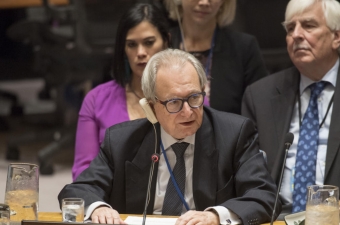ICTY President Carmel Agius today presented the Tribunal’s final Completion Strategy Report to the United Nations Security Council, pending the Tribunal’s closure on 31 December 2017.
The main message of President Agius’ address was “mission accomplished”, as, after more than 24 years of operations, the Tribunal has now completed all judicial work in line with its firm commitment to the Security Council. President Agius reflected on the significance of the judgements delivered in the ICTY’s two final cases, the Mladić trial and Prlić et al. appeal, and highlighted some of the Tribunal’s most notable jurisprudential developments, qualifying them as “points of no return, which forever changed the landscape of international justice”.
Recalling the Security Council’s decision to create the ICTY back in May 1993, the President stated that: “In retrospect…the establishment of the ICTY was one of the international community’s proudest moments”. Moreover, he continued, the Tribunal had fulfilled the prophecy of the ICTY’s first President, the great Antonio Cassese, in becoming a “turning point for the world community”, by showing that it could work in an effective and dispassionate way with the support of Member States and United Nations bodies. President Agius reiterated that the challenges and difficulties faced by the ICTY should “in no way lead one to conclude that resort to international criminal tribunals is not worth it,” reminding Member States that, while international criminal justice would always be time-consuming, unwieldy and expensive, “to live with the alternative of doing nothing and giving in to impunity is to pay a much, much higher price”.
President Agius noted further that the Tribunal had had two histories - that of its supporters, who had “put their signature on a very important page in the history of international justice and the fight against impunity”, and that of those who had denounced the Tribunal from the beginning “for reasons of political or personal gain, blind nationalism and ethnic hatred”. According to the President, the first would be judged favourably, while the second would be condemned.
In offering some personal reflections, President Agius stressed the honour – and responsibility – of being the ICTY’s last President, noting that the end of the Tribunal’s work does not mean that the job is done. He added: “I therefore urge the international community to assure those of all ethnicities throughout the region that they will not be abandoned after the Tribunal’s closure and to keep to that promise”. President Agius also expressed faith that the Tribunal’s successor body, the International Residual Mechanism for Criminal Tribunals (MICT), would successfully carry the Tribunal’s legacy forward.
The President took the opportunity to thank the numerous stakeholders and organisations that have enabled, supported and guided the Tribunal’s work in the past quarter of a century, including the United Nations Office of Legal Affairs, the Netherlands as the Tribunal’s outstanding Host Country, the Informal Working Group on International Tribunals, the European Union, and numerous individual States. In addition, President Agius expressed his utmost and deepest gratitude to the Tribunal’s staff, Principals, and Judges “for their outstanding service to the Tribunal and to international criminal justice”.
In closing, President Agius stated: “As the international community now looks on while mass crimes continue to take place, even as I speak, and geopolitical roadblocks impede any kind of comprehensive justice solutions, we must not forget the political courage that sparked the ICTY’s existence, the Tribunal’s long trajectory, and the need to stay the course.”


